He made his name elsewhere and was as well-known as any player in the NHL when he arrived here in the DMV area nearly 45 years ago, and he was one of the first former Capitals who chose to make his home in this area after his playing days were over.
Caps Mourn Loss of Bryan "Bugsy" Watson
After ending a 16-year playing career in the NHL, the legendary Watson stayed in the area and operated Bugsy's, a popular sports bar/pizzeria in Old Town
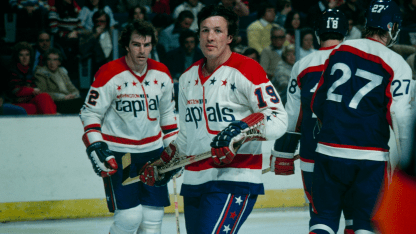
Bryan "Bugsy" Watson joined the Capitals in a deal with Detroit on Nov. 30, 1976, coming to the D.C. area just over two years into the team's existence. He played 155 games for the Caps in two-plus years with the team, but he found the area so much to his liking that he made his home in this region upon retirement from the game. Watson and his family settled here, and he and his wife Lindy opened a popular pizza restaurant and bar on King St. in Old Town Alexandria in 1983. Initially called "The Penalty Box," the place became known as simply "Bugsy's" starting in 1998 and it still is, although Watson sold his interest in the establishment in 2013.
The Capitals and their alumni group suffered a significant loss when Watson passed away at his Maryland home earlier this week at the age of 78. Along with Doug Mohns and Tommy Williams, Watson was one of only very few early Caps whose careers were established during the NHL's rough and tumble Original Six era. He was also one of the first Caps ever to stay in the area and become part of the local community after his playing days were over.
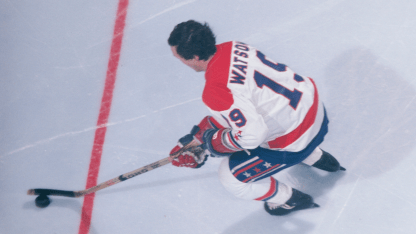
During his playing days, Watson was known as a rugged and fierce competitor who played much bigger than his 5-foot-9, 175-pound frame would suggest on the ice; he was the NHL's all-time penalty minutes leader when his career concluded in 1978-79. But off the ice, Watson was a warm, charming and engaging raconteur who loved the game, loved talking with and being around people and loved doing whatever he could to help out.
"I remember when my cousin Craig [Patrick] got traded here during the season [in early 1977]," says Caps president Dick Patrick. "He was staying in one of those hotels out by the beltway in Prince George's County, and he didn't have a car when he first got here. And Bryan being the veteran guy he was, he took it upon himself to pick him up and take him to practice and help him get situated. That's just the type of guy he was."
When Watson told stories from his playing days, he rarely made himself the center of the tale. As a guy who cut his hockey teeth in the Montreal Canadiens organization in the early 1960s, he didn't have to. He played with a number of legends during parts of two seasons with Montreal, where he debuted as a 21-year-old defenseman in 1963-64. He rode the rails with the likes of Jean Beliveau, Bernie "Boom Boom" Geoffrion, Yvan Cournoyer, Henri Richard and others during the waning seasons of the Original Six era, when six teams traveled from city to city on a train with sleeper cars, and when teams played each opponent 14 times each season.
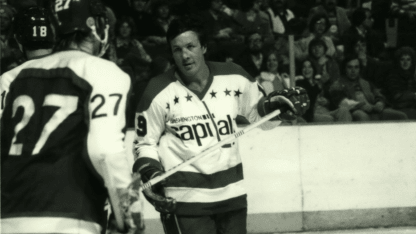
In June of 1965, Watson was traded to Chicago. But a day later, he went to Detroit in the Intra-League draft. Watson's career began its upward arc that season; he played in all 70 games for the Wings, totaling two goals, nine points and 133 penalty minutes. In Detroit, Watson's teammates included future Hockey Hall of Famers Gordie Howe and Andy Bathgate, who reportedly tagged him with the "Bugsy" moniker that hung on him for the rest of his days like he hung on Bobby Hull in the 1966 Stanley Cup Playoffs.
In those 1966 playoffs, Watson put himself firmly on the hockey map when Wings coach Sid Abel gave him the difficult assignment of "shadowing" Blackhawks winger Hull, who led the NHL with 54 goals in just 65 games during the '65-66 regular season.
Despite moving to the unfamiliar position of wing to accomplish this task, Watson pulled it off with aplomb, frustrating The Golden Jet as the Wings advanced to the Stanley Cup Final against the Canadiens. Hull scored twice in the series, but neither goal came when Watson was on the ice. Watson scored two goals of his own in that series, the only two playoff goals of his career. It matched his total from the regular season, and both goals came with Hull on the ice.
Years later, when Hull learned that Watson had lopped off a bit of a finger while wrangling with a chain saw, Hull deadpanned something to the effect of, "Yeah, but how is the chainsaw doing?"
Watson moved from Detroit to Minnesota in the 1967 expansion draft when the NHL doubled in size to a dozen teams. The North Stars traded him back to Montreal the same day, and he played for the Habs, the Oakland Seals and the Pittsburgh Penguins in the next two seasons, finding a home in the Steel City.
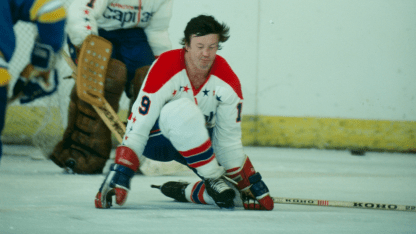
Watson spent the bulk of his NHL career with the Penguins, skating in 303 of his 877 games with Pittsburgh; he played 302 games with Detroit. Routinely racking up triple-digit totals in penalty minutes by this stage of his career, he led the NHL with 212 PIM in 1971-72. Watson dropped the gloves 115 times in his career, fearlessly fighting players much bigger than himself.
After five years in Pittsburgh, Watson was moved to St. Louis as part of a multi-player deal midway through the 1973-74 season. A month later, he was headed back to Detroit in another multi-player swap, a deal in which future Caps teammate Ace Bailey headed from Motown to St. Louis.
Watson's second stint with the Wings lasted just under two years, and he came to D.C. on Nov. 30, 1976 in a straight up deal for defenseman Greg Joly, who had been the first player chosen in the 1974 Amateur Draft just two and a half years earlier.
When he arrived on the scene, the Caps were in the midst of their third season in the league; they won only 19 of their 160 games in their first two seasons. The 1976-77 Caps won 24 games, but still endured an 11-game winless streak (0-5-6) late in that season. They started the 1977-78 season with two wins in their first 25 games (2-18-5), a stretch that included an exasperating 20-game winless run (0-15-5) in which the team went nearly six weeks without tasting victory.
Watson was the oldest player on the team throughout his tenure in Washington, skating in 79 of 80 games as a 35-year-old in 1977-78, the most action he saw in the three seasons he played here. In addition to his work on the ice, he was community-minded away from the rink. In 1977-78, Watson won the Charlie Conacher Humanitarian Award (the NHL's precursor to what is now known as the King Clancy Trophy) for his work with the Special Olympics.
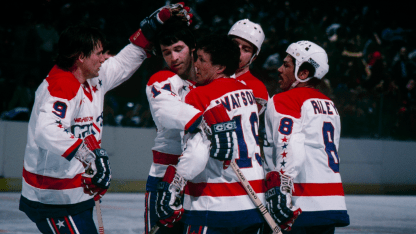
Even as his playing days were winding down, Watson's style didn't change. During an early season loss to the Canadiens in Montreal in October of 1977, Watson mixed it up with a few of the Habs, who were then in the midst of a run of four straight Stanley Cup titles.
"Watson has always been a bit of a loudmouth and a troublemaker," Canadiens coach Scotty Bowman told The Washington Post's Robert Fachet after the game. "What happened was he came by the bench yelling at me, telling me I'd come a long way from Peterborough, or something. I don't talk to the opposition. I just turned away.
"But later he came back and he was yakking at [Larry] Robinson and [Serge] Savard. I told him, 'Bryan, save your breath and use it for more stops and starts.'
"He's got a lot of spunk, and maybe it wears off on the team, but when you're the opposition sometimes you get fed up with it. I'd like to have him on my team, but when he's on the other team, I don't like it."
In a preseason piece for The Hockey News in the fall of 1977, Russ White wrote: "Watson, who'll be 35 in November, may be at the same time the best liked or least liked but the most admired player in the National Hockey League."
Watson was a pesty player who loved to talk before, during and after games.
"I remember Craig telling me of his knack for getting people to laugh in the middle of games," recalls Patrick. "They'd be lining up for a face-off and he would lean over and say something like, 'If anything breaks out, I want so-and-so, because if he thinks his hands hurt now, wait 'til he gets done hitting my head!'"
On March 2, 1979, Watson was released and he signed with the WHA's Cincinnati Stingers the same day, playing the final 21 games of his long career with them. He briefly coached Wayne Gretzky as both an associate coach and head coach of the 1980-81 Edmonton Oilers, but soon realized coaching wasn't for him, handing the reins back to Glen Sather, who went on to lead them to a quartet of Stanley Cup titles before the end of the decade.
Watson came back to the DMV area and made his home here, opening the restaurant in 1983 and devoting his energies to it for the next three decades. Watson amassed a number of fun and memorable hockey artifacts, sweaters, equipment and photos and proudly displayed them at Bugsy's, where he'd happily regale the clientele with stories of the people he played with and against.
"I know the players, throughout his time at the restaurant, that's where they would go to watch the game, drink a beer or eat a pizza," says Patrick. "He was always really supportive of and receptive to the Caps and he was a very generous guy.
"He was a character around here. Even people that weren't huge Caps fans or sports fans, they knew his place and they knew his reputation. He was a big part of the local community."
Watson would also frequently drive a stack of pizzas over to the Caps' Ballston practice rink and offices, and he would linger to happily chat with anyone and everyone who stopped by the kitchen for a slice or three. He loved the game and was as thrilled as anyone when the Caps finally hoisted the Stanley Cup just over three years ago in Las Vegas.
We will miss Bugsy's oversized heart, his joie de vivre and the incredible stories he loved to spin. But we're also so thankful to have had him in our lives and in our area for these last several decades. Fare well and rest in peace, Bugsy.


















